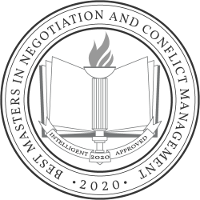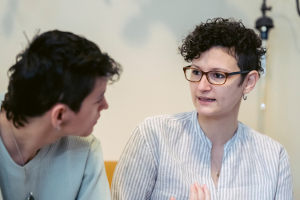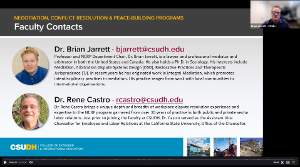NCRP M.A. (Online)
Latest News

Master of Arts Degree in Negotiation, Conflict Resolution & Peacebuilding (Online)
THE PROGRAM
 The online Master's Degree program in Negotiation, Conflict Resolution and Peacebuilding at California University, Dominguez Hills teaches participants valuable conflict resolution and conflict management skills and knowledge which may be applied directly to police work, counseling, education, human resources management, labor relations, litigation, business negotiations, supervision and administration. The Federal Bureau of Labor Statistics projects a 9% increase in arbitration, mediation, conciliation jobs between 2014 and 2024.
The online Master's Degree program in Negotiation, Conflict Resolution and Peacebuilding at California University, Dominguez Hills teaches participants valuable conflict resolution and conflict management skills and knowledge which may be applied directly to police work, counseling, education, human resources management, labor relations, litigation, business negotiations, supervision and administration. The Federal Bureau of Labor Statistics projects a 9% increase in arbitration, mediation, conciliation jobs between 2014 and 2024.
Other career applications include alternative dispute resolution (ADR), mediation, negotiation, arbitration, public policy, social work, teaching, inter-cultural and community conflicts, corporate contract and purchasing.
Student Testimonials & Accomplishments
 Negotiation, Conflict Resolution and Peacebuilding program attains Best Buy Image "Best Buy" status from GetEducated.com ► | [Download Microsoft Word]
Negotiation, Conflict Resolution and Peacebuilding program attains Best Buy Image "Best Buy" status from GetEducated.com ► | [Download Microsoft Word]
"I got my degree in 2002 & am just as excited today about the accomplishment as I was then" —Seth Glassman
Brian Jarrett draws from a wealth of experience to lead the NCRP program ►
What You Will Learn
 Participants will improve their computer, listening, speaking, writing, critical thinking and problem-solving skills. This is a 36-semester unit graduate program, which can be completed in two years without coming to the CSU Dominguez Hills campus. Courses run 12 weeks each term. Students have a choice of completing a thesis or portfolio as a culminating event.
Participants will improve their computer, listening, speaking, writing, critical thinking and problem-solving skills. This is a 36-semester unit graduate program, which can be completed in two years without coming to the CSU Dominguez Hills campus. Courses run 12 weeks each term. Students have a choice of completing a thesis or portfolio as a culminating event.
The program involves a comprehensive study of the practical skills, methods, theory, and research needed to be an effective mediator, negotiator and conflict manager. The degree addresses many needs of beginning and mid-career professionals in government, business, and non-profit organizations, and those interested in a career change.
Online NCRP Courses
The degree can be completed without ever coming to the campus by anyone anywhere in the world with access to the Internet. Classes are asynchronous (tasks completed on- or off-line at the student's convenience), with on demand video lectures for students to view.
Additional features include home pages for students and instructors, chat and discussion rooms, electronic submission and return of papers, and individual, secure, access to personal course records at all times. Students can complete the course of study in two years or they have up to five years to complete the program. Students must also be in continuous enrollment.
California State University Dominguez Hills provides the following information for its online and distance learning students in compliance with State Authorization information & Consumer Complaints federal Title IV regulation. Federal law [Section668.43(b)] requires all institutions must disclose to all students or prospective students the complaint agency in all states where students reside. If a student has a complaint or concern, information on how to contact a state agency and register a complaint, can be found at the following website: http://www.calstate.edu/AcadAff/state-regulatory-authorizations/index.shtml.
Information & Registration
Have questions about the program? Call 310-243-2075, email learn@csudh.edu, or use our LiveChat ↘ to ask questions or leave a detailed message about this program.
Find us on Facebook! CSUDH Negotiation & Conflict Resolution Programs
Connect to us on LinkedIn! MA Negotiation and Conflict at CSUDH Continuing Education
General Questions
What is the composition of the student body in this program? Do you find more mid or early career students?
We have a broad range of students in the program. Some students are fresh out of their undergraduate programs, many are mid-career and active in their field, and we even have students who are actively looking to change careers later in their life, really to pursue a completely different career path.
How much does the program cost?
Our master's program cost is $321 per credit unit and it is a 36 unit program. The overall cost will be about $11,500 plus books and other fees.
As for the post-master certificate program, the unit cost is the same, $321 per credit unit; that program is 18 units, so the cost will be at just below $6,000 plus books and fees.
Can you please provide financial aid, grants, scholarship info?
Please see our Financial Aid Resources information.
What is the average time to complete the program?
Students can complete the NCRP program in as little as 18 months.
Are there any courses/classes just to become an arbitrator?
Yes, we do have specific arbitration courses. Please view the course listing for more information.
I am interested in a position in foreign service. Would this program be useful to me?
Yes, we have a former Ambassador, Steven Rhodes, who teaches in this program. You can also tailor your interest in your classes by speaking with your instructors about your coursework.
What is the post-master degree? What career opportunities are open to those who complete the post-MA graduate certificate?
People who come back to earn the post-masters certificate want to hone their knowledge and skills in a particular area. They also gain more professional contacts in that particular area.
Admissions Questions
I have exactly 2.99 GPA in my Bachelors. Am I able to get in?
If we do not meet the 3.0 minimum GPA, is there a separate process for conditional admittance based on experience, for someone who has been in the field for 10+ years?
For those who fall below the minimum 3.0 requirement, please go ahead and still apply. There is a conditional admission process, whereby the student can be admitted if they have other attributes that may qualify them for the program. If you are close on some of the requirements, you are encouraged to apply and write a strong biographical essay. If you do not meet the minimum GPA requirement, write a strong biographical essay and prepare those who are writing your letters of recommendation to hit on the points about you and your capacity to be successful in the program because that information is also used to determine whether or not you're ready and likely to be successful in the program.
You can also take one or two courses before applying to the program, which can demonstrate your ability to do the work as well as raise your GPA.
I earned my bachelor’s degree in another country and I want to apply to the program; what documents are required?
In addition to the documents required for the program, International students would need all of the documentation listed at:
https://www.csudh.edu/ceie-intl/intl-student-info/future-students/admission-criteria-deadlines/
If CSUDH was my previous college, do I still need to request transcripts?
You can submit unofficial CSUDH transcripts in the application process.
Is the biographical essay a 500-word minimum or maximum?
The biographical essay has a 500 word minimum.
Does one need recommendation letters during application?
Yes, letters of recommendation are required. Your 3 letters of recommendation should be educational professional references and not personal references. It is preferred that these letters be original and on letterhead.
For more information, visit: https://www.csudh.edu/ncrp-ma/admission-requirements/
Do I need to submit my BA degree info or just my Masters degree info, if I already have a Master’s degree?"
Please submit both your undergraduate and master’s degree transcripts.
Applicants must provide one (1) official transcript from each post-secondary institution attended (post-baccalaureate course work included) to be sent to the Admissions and Records Department at CSUDH: admit@csudh.edu
If the institution providing the transcript can only mail the transcript, mail it to:
Admissions Office
California State University, Dominguez Hills
1000 E. Victoria Street
Carson, CA 90747
Can I defer admission to another semester if I am accepted?
Yes. Contact the program coordinator for more information.
Do people in law enforcement pursue this degree?
Yes, the degree began as a program for law enforcement, and many people in the field use it to move up in their field.
Program Questions
How many hours a week do I need to commit to the program? How does a student engage with instructors and other students, office hours, etc.? What does a typical class experience look like?
Although this is an asynchronous program, individual instructors may utilize standard web conferencing tools like Zoom and Microsoft Teams to all students to experience actual synchronous environments similar to many of our public services (courts, arbitration services, etc.) do. We also use the campus learning management system's discussion boards and lecture recordings as well.
Students enjoy the opportunity to use groups and role playing in the online environment to fully delve into real-world instructions, goals, and outcomes in the negotiation process, which provides an optimal learning experience.
What percentage of applicants are typically accepted into the master’s program, and what is the ratio of faculty to students?
We currently work at a student-to-faculty ratio of 18:1, which is very manageable and helps to maintain a higher quality of communication.
Is there a minimum or maximum number of credits required per semester?
We recommend a maximum of two courses per term; a graduate program feels “heavier” than an undergrad program and requires more work, but on average, you would need to devote at least an evening per week per class, and more depending on the student. Writing is a featured component of the coursework, as well as assigned reading; it’s really about your own time management, plus the nature of the particular course, so students may consider course work on a term-by-term basis, and talk to fellow students to best assess your course load and time needed to dedicate to the program.
Are there group projects where you have the opportunity to connect with your peers?
Most of the time, the students work in a group work environment.
Can I get involved in research as a career, and will this program help?
A number of our students get fully involved in research and publish their papers - which we highly encourage - in trade journals, peer-reviewed journals, professional and academic journals, and book authoring. We especially recommend students publish if they are interested in entering the community college teaching field, and even provide an equity grant designed for people that want to develop and give back as professors and teachers.
Is there a mentoring program within the Master's program?
There is an informal mentoring program. Through your work with instructors on projects, you will develop an understanding of the field and how to get into and move up in the field. These instructors can also help you to network in the field in specific areas. Alumni are also available for connection.
Do you need to be in a current position where you can apply the skills while participating in the program? Or, will the faculty help make the connection to practice opportunities as needed?
No, you do not need to be in a position to start with. You can use the connections you make with our faculty and alumni as well as fellow students to help network to gain a desired position where you can use these skills.
Do you have a connection with a JD program?
Yes, we have a connection with Southwestern University Law School. We also have informal agreements with a number of universities. Please contact our program coordinator for more information.
Are there internship programs?
We have had internship opportunities in Hawaii, Canada, Alaska, and other locations all around the world; for example, we have people work with indigenous peoples in Alaska in various settings. Please contact the program faculty for assistance negotiating or sponsored opportunities.
Do you have any joint programs with a JD?
We do have a joint program with South Western University’s law school program which connects our master’s program with their JD program; we also have informal agreements with a number of universities, such as: the University of Hawaii Richardson School of Law; the University of Las Vegas Saltman Center for Conflict Resolution, the University of Missouri, Salisbury University, Simon Fraser University, and others. Please contact our program coordinator for more information.
I am very interested in pursuing a foreign policy/international relations and development focus. What are the opportunities for international studies/case study within the coursework and classes?
Former Zimbabwean Ambassador, Professor Steven Rhodes brings practice knowledge from his embassy experience and subject matter experts to the program.
Arbitration covers international and collective bargaining subject areas as well: students should consider working with faculty to formulate course and thesis content that incorporates international aspects. We encourage students to submit their final paper in an area that prepares them academically and professionally for where they want to be in the career they’re pursuing.
Watch Our Most Recent Cyber Conferences on Dispute Resolution:
12th Annual: https://www.youtube.com/watch?v=IzjjZvHvSWg
13th Annual: https://www.youtube.com/watch?v=Q4Ejb8aDCFo
14th Annual: https://www.youtube.com/watch?v=st8PEIcPa-I
